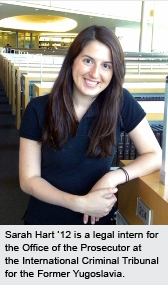Reunification
For up-to-date information regarding the reunification of Penn State's two law schools, please click here.
For up-to-date information regarding the reunification of Penn State's two law schools, please click here.
June 22, 2011

Sarah Hart ’12 was an elementary school student in Emmaus, Pennsylvania, when she received a thin red Scholastic magazine detailing the violence, chaos, and terror as Yugoslavia gradually broke apart. At the dinner table, she and her family talked about what they saw on the evening news—refugees, emaciated prisoners, and the hallmarks of genocide. Fifteen years later as a rising third-year student at Penn State Law, Hart works to bring perpetrators to justice as a legal intern for the Office of the Prosecutor at the International Criminal Tribunal for the Former Yugoslavia (ICTY).
“ICTY makes human rights real. We are helping to bring voice to the victims who lived through this and bring perpetrators to justice,” said Hart, who splits her time between the joint prosecution of Franko Simatovic and Jovica Stanisic and, most recently, Rathko Mladic.
Arrested on May 26 after almost 16 years in hiding, Mladic faces charges of genocide, crimes against humanity, and war crimes for the 1995 Srebrenica massacre of 8,000 Muslim men and boys and for the 43-month siege of Sarajevo in which 12,000 were killed. Lead prosecutor on the case is Dermot Groome, a visiting professor at Penn State Law and Senior Trial Attorney at the Office of the Prosecutor for the International Criminal Tribunal for the former Yugoslavia (ICTY). Professor Groome supervises Hart’s internship.
“Mladic was in charge of the Bosnian Serb Army (VRS),” she explained in an interview from The Hague. Hart and fellow Penn State Law student Ken Charette were on-site when Mladic arrived.
“The day they brought Mladic in was just unbelievable,” said Hart. “We sat in the cafeteria as people were celebrating, watching live media coverage of his arrival.”
The internship is an extension of Hart’s interest in criminal law. Last summer she interned in the Lehigh County District Attorney’s Office in Allentown, Pennsylvania. She finds many parallels between international criminal law and domestic criminal law. In both instances, the prosecutor’s office builds a case, researches law and facts, answers defense motions, and tries the case. At ICTY, the crimes at hand are much broader in scale, and the evidentiary record stretches to thousands of volumes in many languages.
Hart explains that the best part of her position is that she believes so strongly in the goal of ICTY. “Every day we are working through this and every day we are closer to justice,” she said.
International Law at the Highest Level
Established in 1993, ICTY has about 1,100 staff members, including fifteen permanent judges and ten ad litem judges. Classmate Ken Charette ’12 is spending the summer working in one of three Trial Chambers. Judges are responsible for deciding guilt or innocence and then imposing a sentence.
Charette is assigned to the chambers handling the trial of Momcilo Perisic, who was the Chief of General Staff for the Yugoslav Army and answered only to Slobidan Milosevic. Perisic’s defense rested on June 11.
Charette observes as the judges debate portions of the draft of the final judgment; interns often help to draft portions of the judgment.
“The judges at ICTY are top-notch and come from different legal traditions around the world,” said Charette. He is pleased to work with Baknoe Justice Moloto, formerly a judge on the High Court of South Africa; Michele Picard, who was a Judge on the Tribunal de Grande Instance (Court of Major Jurisdiction of Paris); and Pedro David, who comes from the National Court of Criminal Cassastion of Argentina.
“Deliberations are a great opportunity to participate actively in the practice of international criminal and humanitarian law at the highest level,” said Charette. “Everyone is so collegial and interested in what other people think and why.”
Charette, who hold a bachelor’s degree in international relations from Michigan State University, says the biggest difference between U.S. law and international law is the length of judicial opinions. Last summer Charette clerked for the Chief Justice of the Michigan Supreme Court. Now, he finds U.S. judicial opinions are dwarfed by his current projects. ICTY opinions can be hundreds or thousands of pages in length.
“This has been the experience of a lifetime,” he said.
Cherie Millage Fellowship Program
Both Hart and Charette are working in ICTY through the Cherie Millage Fellowship Program. Established by students in 1990, the program enables law students to work in non-paying areas of public interest law during the summer after their first or second year at Penn State Law.
“The high impact of the Cherie M Millage Fellowship program is a direct result of the overwhelming support of the Law School’s faculty, staff and students dedicated to increasing awareness of the role of lawyers in increasing access to justice. Fellows serve populations world-wide, providing essential support to existing legal programs and gaining unparalleled experience in the practice of law in the public interest,” said Kate Cramer Lawrence, director of public interest programming at Penn State Law.
The International Justice Externship Program
Penn State Law also offers a year-long experience in international law through the International Justice Externship Program at The Hague. Under the supervision of Professor Groome, students can work side-by-side with senior prosecutors at the International Criminal Tribunal for the former Yugoslavia and the Special Court for Sierra Leone.